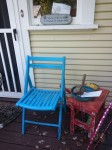Last updated on October 13th, 2023 at 09:48 pm
 Part of my starting over at mid-life is being real about my health. Good health ensures I have the energy and vitality needed to pursue my book publishing dreams. As we age, our physical energy and resilience may naturally decline, making it even more critical to stay healthy to maintain stamina.
Part of my starting over at mid-life is being real about my health. Good health ensures I have the energy and vitality needed to pursue my book publishing dreams. As we age, our physical energy and resilience may naturally decline, making it even more critical to stay healthy to maintain stamina.
I recently discovered that it is recommended that people over 50 get a colonoscopy.
Life is cruel and a little funny in an ironic way. Just as a woman of a certain age is starting to feel good about mid-life, she is faced with an onslaught of reminders that age 50 means her body will slowly fall apart from here on out.
Suddenly, there are medical screenings and tests she’s encouraged to endure. It’s a reminder that her youthful years are behind her, and in the years ahead, her body will slowly deny her access to that youth. And here’s the weird thing: it’s all too often the top subject to talk about amongst friends. I know because that’s what’s happening with me and my friends!
And the weirdest subject of all: colonoscopy.
I turned 50 almost two years ago. Since then, I’ve had a tap-tap-tapping on my shoulder. You know the one. It’s the one you’ve known was coming for years and thought was no big deal, but now that it’s here, you don’t feel so brave after all. Ah, the dreaded colonoscopy. I avoided it for no good reason. Well, it really is a good reason, just not a reasonable reason; I didn’t want to drink all that pooping juice and then spend 24 hours on the toilet. It wasn’t about the procedure itself; that didn’t worry me. It was the uncontrollable pooping that freaked the hell out of me. So, I successfully avoided getting one; truth be told, my doctor didn’t even bug me about it. He’s nice that way, or maybe I’m just incredibly skilled at changing the subject.
But then something happened.
It was a girl’s night out with one of my dearest friends. We’ve known each other since junior high. She went camping with my family, and we jogged together as teenagers in matching red jogging outfits (I am not proud of that fashion choice). Our daughters were born about the same time and played together. Those little girls are now nearly 30 years old!
Now, she was sitting across from me telling me the news: her husband finally had a colonoscopy, and there was a problem. He had stage 3.5 colon cancer. Over the next several months, he went through chemotherapy. My friend was there every step of the way. Sometimes, when she spoke of the struggles, she got teary. She was strong and remained positive most of the time, with her sense of humor intact.
One day, she asked me, “Have you had a colonoscopy?” I shook my head. “No.”
I was ashamed that I hadn’t gotten one for a silly reason. Evan was going through the torture of treatment, and my dear friend was worried she’d lose her husband to colon cancer. And I didn’t want to have a procedure that could save my life because it would make me poop.
So, I made her a promise. “I’ll get a Colonoscopy,” I said.
The reality is that having a colonoscopy makes sense. Polyps found in the colon can often be taken out before they become cancerous. And if colorectal cancer is found, it responds well to treatment. If left without treatment, it can permeate the colon wall and metastasize into nearby organs, making it less responsive to treatment. That’s the reality.
My gastroenterologist scheduled me for a colonoscopy and an endoscopy–bottom up and throat down. Chronic heartburn prompted the second test. But both could be done at the same time. My procedures were scheduled for the same day. No biggie, right? Ten days before the procedures, I was still pretty calm. I wasn’t worried, really, a week before the procedures I started to change. It kicked off when I picked up the prescriptions and I began to read the directions my doctor had printed off for me. Then what did I do? I researched it to death!
The whole process would start three days before the procedures. I went on the diet, cutting out fiber three days before the procedure. Then, two days before, I ate only the foods on the approved list. Then, a day before, I went on a liquid diet.
The night before my 7:30 a.m. appointment finally arrived. At 5:30 that night, I took the pill for nausea. At 6:00 pm, I started on the 3 liters of pooping juice (official name GoLytely). I followed the directions carefully, drinking one eight-ounce glass every 15 minutes; it was very salty. I kept telling myself it was celery juice, and it did kind of taste like it. The first 2 liters went OK. I sucked on a lemon in-between gulps, which helped with the nausea caused by simply drinking an enormous amount of fluid so quickly.
The last liter for the night was more difficult. I took the advice I’d read, drank eight gulps, and then sucked on a chunk of rootbeer popsicle. Wow! That made a huge difference. It was about this time that it started to work, and I began walking (no, not running, like I’d imagined) to the bathroom. The last of the 3 liters down, I stayed up and watched a few episodes of a Netflix series. Then I laid down for the night. After about two hours of getting up and down and going to the bathroom, my tummy settled. I went less and less. By morning, I wasn’t going anymore at all. But I wasn’t done. As directed, I still had to drink one more liter between 4:00 a.m. and 5:00 a.m.
My sister took me to the hospital for a Colonoscopy.
The nurses were waiting for me to arrive and immediately started taking my vitals, asking about the medications I take and when I’d eaten last. One nurse started my I.V. and did so effortlessly. I was shocked at that. Usually, just getting an I.V. started is a huge ordeal. The anesthesiologist came in and explained the type of anesthesia I’d have. He assured me he’d watch me and track my vitals during the procedure. He also said not to do anything for 12 hours after the procedure a drunk person shouldn’t do. I was wheeled off to a small procedure room. A nurse helped me get propped on one side, and the drugs took effect.
I woke up still on my side, but now back in the hospital room where my sister was. I was very woozy and in a pleasant haze. The nurse explained that air is pumped into the colon during the procedure. She said to let all the gas come out, adding, “Gas is music to my ears.” It’s probably the only time in your life that someone will tell you to pass gas.
I was also starving. A nurse brought me an egg salad sandwich. I ate half of it, tossed the crust in the garbage can across the room, and missed. The nurse picked it up. This is not something I’d normally do, so I’m guessing the drugs were still working. The doctor came in briefly–too briefly. No polyps. No cancer. There was damage to my esophagus, and I had an ulcer in my stomach. That didn’t surprise me because that’s where I’ve had pain when eating certain things for years.
I was told I could get dressed. I went to the bathroom and tried to put my pants on. I lost my balance and nearly fell. But I caught myself. The nurse wrote a few notes on the doctor’s sheet to clarify what things meant—much appreciated. Took a wheelchair ride to my sister’s car. She drove me home.
I watched TV and hung out with my son for the remainder of the day and night. I felt fine. It’s only in looking back that I realize my memory of certain things is hazy. What did I say to my neighbor? I still don’t know.
The day after my colonoscopy, my doctor’s nurse said the biopsy was fine. No cancer. Well, I didn’t know she’d done a biopsy. I’m sure she told me, but it didn’t register in my haze. On a positive note, I didn’t lose any sleep over it.
My Personal Colonoscopy Advice:
1. Plan on two full days of just taking care of getting this test done: the day before and the day of.
2. Suck on fresh lemon or lime wedges, or chew on ice or small chunks of rootbeer Popsicles to stave off nausea.
3. Cover your clocks. Seriously. At night, you might be able to sleep a bit in between trips to the bathroom. But if you look at the clock and see that only a few minutes have passed, it’ll only make the night drag on.
4. Set a stopwatch every 15 minutes to track when to drink.
5. Set your alarm clock to get up in time for your colonoscopy, but have a friend call you too. That way, you’ll sleep sounder when you can – knowing you won’t sleep through your appointment.
6. Find a television series to get your mind off of what’s going on.
7. Head to the bathroom whenever you feel the urge, even if you sit back in your easy chair.
8. Choose someone good at listening for details with you at the hospital. Your doctor will likely have information to share after the procedure, and you might be unable to concentrate or ask intelligent questions.
9. Read all of the information the doctor gives you before the procedure and follow it to a “T.” You do not want to take a chance that you aren’t “cleaned out” and have to repeat the colonoscopy!
I hesitate to talk about this part of it, but I learned a valuable lesson. I did not include part of my experience in the narrative above. That’s because my doctor prescribed medications beyond the norm for no good reason. I didn’t ask questions, and I wish I had. She prescribed 8 Dulcolax (a laxative) and a bottle of Sodium Laxative. I took both of these as prescribed three days before the procedure and reacted terribly. I was throwing up all night long and nauseous the whole next day. I was so nauseous I was afraid I couldn’t drink the 4 liters of GoLytely. Eventually, my tummy did settle in time, but barely. Since this was my first colonoscopy, I didn’t know this amount of laxative wasn’t the norm. I will not be so compliant next time. But of course, in the end (pardon the pun), it’s up to you and your doctor to decide what’s right for you.
I will address my concerns with my doctor at the 2-week follow-up appointment. It wasn’t as bad as I’d imagined. There were no accidents or messes. While “going” was indeed urgent, I didn’t feel like my body was completely out of my control. I feared that, but it didn’t happen. Drinking all that liquid was OK until the last liter the night before. And then it was difficult. But it wasn’t terrible. The procedure itself was a piece of cake. When I got to the hospital, my system was cleared out. The anesthesiologist did his job, and I was in la-la land. I woke up after the procedure in a pleasant haze. At home, I actually enjoyed myself. I ate whatever sounded yummy and watched movies. My tummy rumbled and protested a bit, but that was about it.
The really good news is that the doctor said to return in 10 years. I will not hesitate next time.
Here’s the interesting part. While I started out feeling like having a colonoscopy was a sign of getting old, I now feel quite the opposite. I feel strangely empowered. I took a step toward ensuring I’d be here for my three children and my future grandchildren. I left this whole experience wanting to take better care of what I’ve got through diet, exercise, and everything healthy. I want to stay healthy to travel, achieve my personal goals, and enjoy my family and friends. I want to care for my mind, body, and spirit in the best way I know how.
Good health after age 50 is essential for pursuing your big dreams because it provides the foundation for energy, longevity, mental clarity, emotional well-being, and overcoming challenges. It’s an investment that benefits you and can inspire and influence those around you, making it easier to turn your dreams into reality.

Karen Alaniz is a writer, published author, and a home renovation expert now that she’s remodeled an old farmhouse by herself. She strives to help women who are scared it may be too late to start over after a certain age and she encourages empty-nest women to invent a new, prosperous and full life–just like she has done. You can read more about Karen on her Amazon Author page.
Note: Articles by Karen may contain affiliate links and may be compensated if you make a purchase after clicking on an affiliate link.




